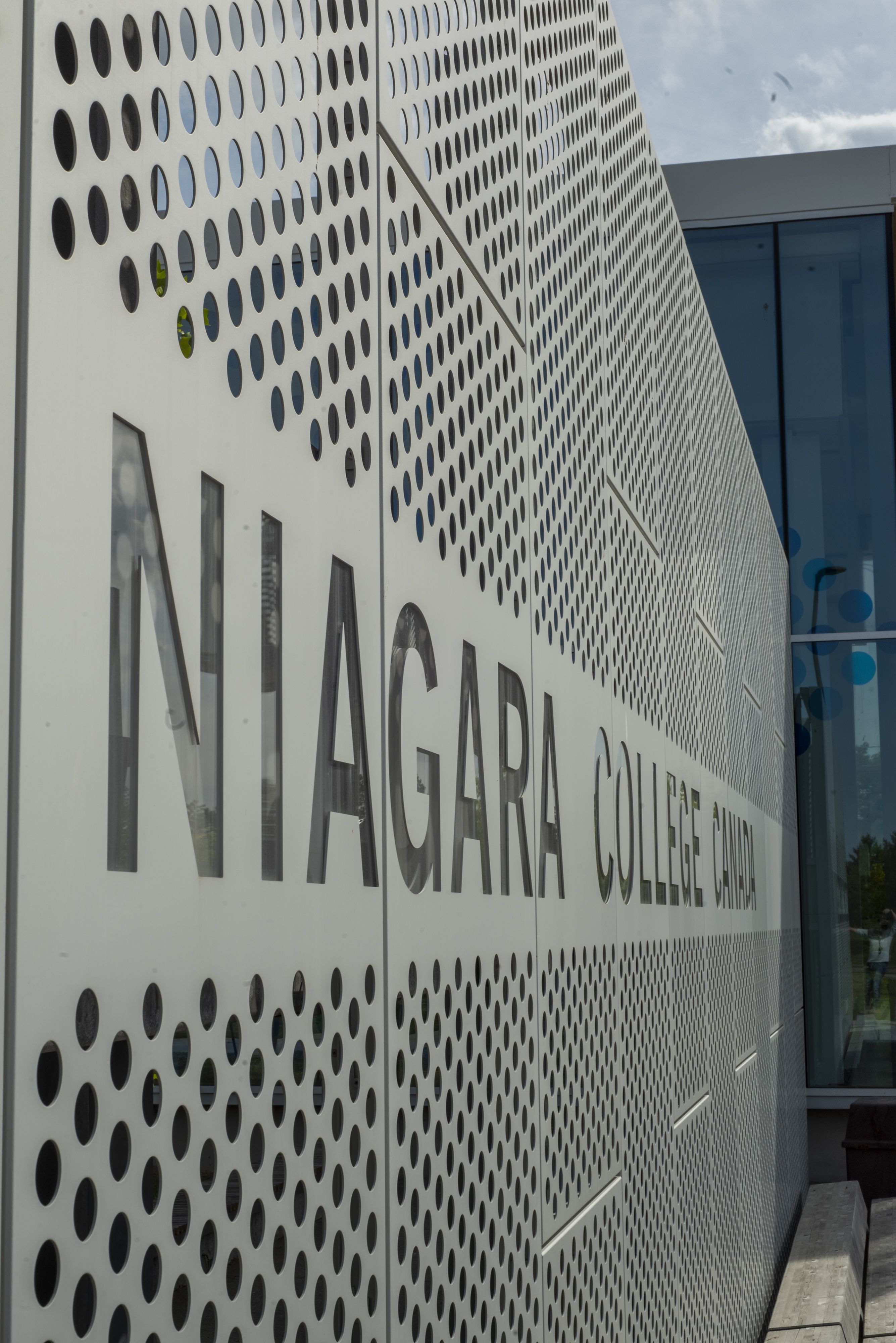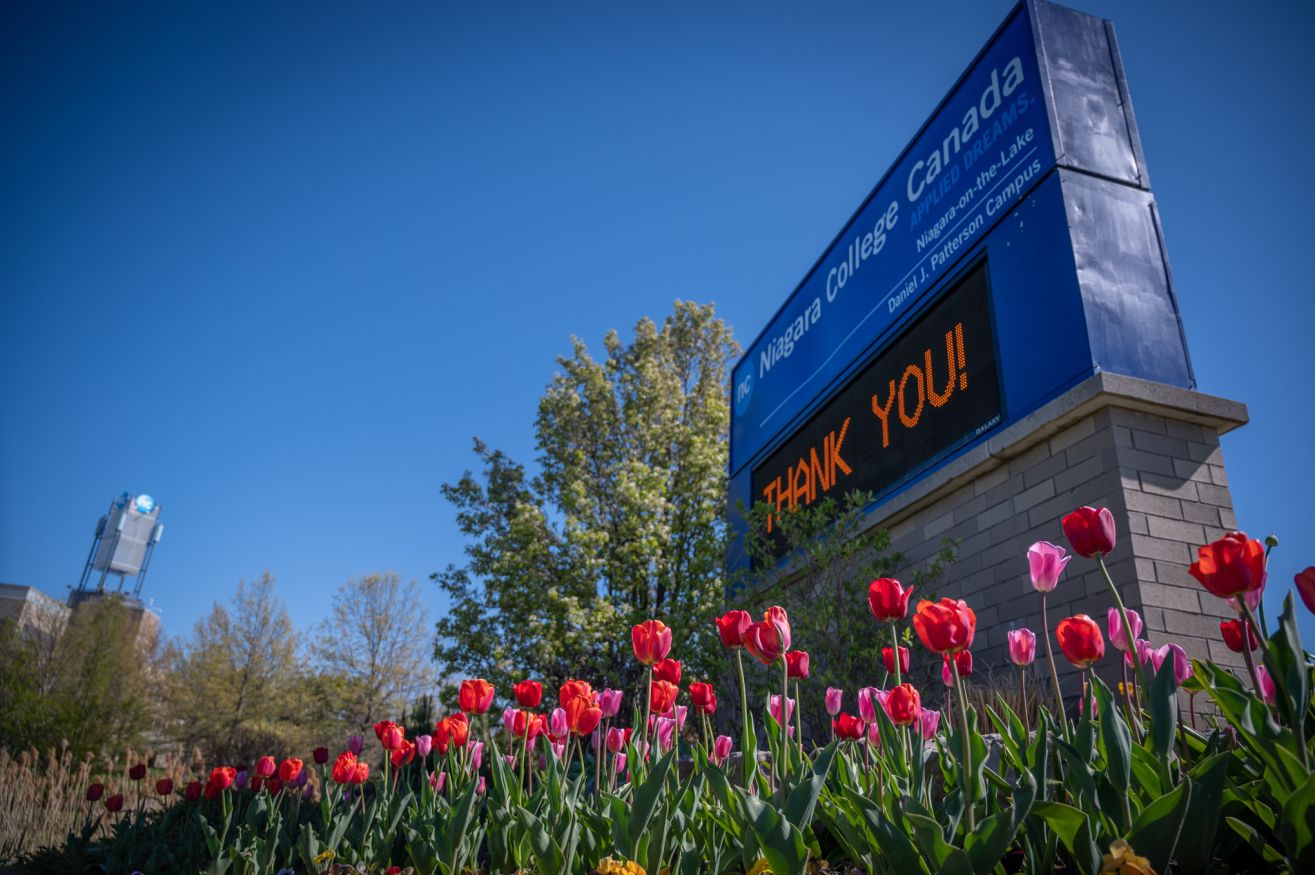Skilled trades build communities.

With Canada's construction and housing demand far exceeding labour supply, the need for tradespeople is urgent. Niagara College is leading the way to train the next generation of skilled trades workers and apprentices. But we need your help.

The skilled trades industry in Niagara Region and across Ontario is grappling with growing labour shortages, impacting the timely completion of projects and the overall economic vitality of communities.
All levels of government have turned their attention to skilled trades as a driving force for job growth to address immediate and long-term infrastructure needs.
According to The Great Rebuild report, issued by Royal Bank of Canada, Canada will need more than 500,000 additional construction workers on average to build the homes that will be needed between now and 2030.
Additionally, approximately one in four of Canada's four million tradespeople will need to upskill in the next five years to meet industry demands effectively.
Recent projections also estimate that about 700,000 skilled trades workers will retire between 2019 and 2028, creating an ever-growing need to recruit and train thousands more.
That's why carpenters, electricians, welders, millwrights and metal fabricators are in demand now more than ever, and those skilled in pipefitting, HVAC and plumbing are needed to help unlock Canada's construction and housing crisis.
Canada facing construction and skilled trades worker shortage.
“Ontario needs 100,000 more skilled workers over the next decade to deliver on our government's ambitious infrastructure plans, including building at least 1.5 million homes by 2031,” said David Piccini, Minister of Labour, Immigration, Training and Skills Development.
Speaking in Niagara Falls in April 2024, Minister Piccini added that approximately 22,700 of those jobs are located in the Niagara and Hamilton regions. These areas currently have major projects under way, such as constructing a new hospital, upgrading water and sewer systems, building new housing, and improving schools and roads. Additionally, there are plans for future work on hydroelectric facilities.
That is why the time for decisive measures is NOW.
Provincial forecasts indicate there's a need for about 298,600 new housing units in Niagara by 2051, which is an increase of 96,400 units over the current supply of 201,600.
Urgent Demand for Skilled Trades

More than 256,000 new apprentices are needed over the next five years to meet demand in Canada. Ontario alone needs 100,000 more skilled workers over the next decade.
Niagara College's School of Trades has been at the forefront of applied education for more than five decades, consistently pioneering innovations and adjusting to meet the evolving demands of the construction sector.
"We are eager to get our skilled trades graduates into lucrative, in-demand careers, but we are at capacity in most of our facilities with timetables running into the late evening and weekends," said Leo Tiberi, Dean of Media, Trades and Technology at Niagara College. "Considerable growth in our enrollments is a positive sign and it means that we need to act fast to upgrade and expand facilities to accommodate incoming students and the acute worker shortages in skilled trades."
Niagara College's skilled trades graduates are well prepared and ready to enter the workforce, but they need more support. They need your support.

Carpenters contribute to the construction of residential and commercial structures, shaping the physical landscape of a community and creating spaces for people to live and work.
Electricians play a crucial role in ensuring the safe and efficient installation and maintenance of electrical systems, powering homes, businesses, and industries across the country.
Welders provide essential skills for joining metals in various industries, including manufacturing, construction, and infrastructure development.
Millwrights specialize in installing, maintaining, and repairing machinery, ensuring the smooth operation of industrial facilities and manufacturing plants throughout the nation.
Metal fabricators craft custom metal components used in diverse applications, ranging from automotive parts to architectural elements, contributing to innovation and manufacturing excellence.
Automotive technicians maintain and repair vehicles, ensuring the safety and reliability of transportation systems for individuals and businesses.
Sensible Solutions
Our clear plan for addressing the skilled trades crisis.

Graduating more women and underrepresented groups in trades
Niagara College will secure funding for scholarships and bursaries to help more students pursue their dreams by making college education more accessible to all.
Underrepresentation of diverse groups in trades is hindering the progress and inclusivity of the industry.
That's why encouraging greater representation from underrepresented groups in trades programs, including women, individuals with disabilities, newcomers to Canada, Indigenous Peoples, and other equity-deserving groups, is the solution to creating diversity and attracting more people to the skilled trade.
As of 2020, women accounted for only 5% of tradespeople in the industry, indicating a significant gender disparity. While there has been progress, with women comprising 12.4% of the construction workforce nationally in 2017, including both onsite and off-site roles, there is still considerable room for improvement in increasing female representation in the trades. In Ontario, the percentage of women in trades occupations has gradually risen to 8.7% in 2022, up from 5.9% in 1987. Despite this advancement, challenges persist, underscoring the need for ongoing efforts to foster a more inclusive environment for women entering the trades.
Minorities, who make up 20% of the population, are notably underrepresented in the trades sector, accounting for less than 9% of jobs. This lack of diversity further exacerbates the skilled tradesperson shortage. Even Federal Skilled Trade Programs are struggling to attract sufficient numbers of new skilled workers, highlighting the systemic challenges facing minority groups in accessing opportunities within the trades.
Both groups experience much slower earning growth among employed skilled trades and are less likely to perceive themselves as being equally represented or valued within the industry.
Overall, 96% of Canadians agree the workforce needs more skilled trade workers, and 92% believe there is a considerable opportunity in skilled trades. A solid 91% trust vocational/trade schools to give them the education needed to have a successful career and Niagara College is ready to meet this challenge.
Amidst the urgent demand for trades professionals to fill thousands of vacancies, Niagara College will ensure our trades students are well-equipped with the necessary skills for their specialized apprenticeships and as they enter the workforce.
Women in Trades event exposes high school students to skilled trades opportunities
Niagara College hosted a Women in Trades event, which gives students hands-on opportunities to explore the labs within the School of Trades. Eighty female students in Grades 10, 11 and 12 from schools within the District School Board of Niagara (DSBN) and the Niagara Catholic District School Board (Niagara Catholic) spent the day learning about the opportunities that await them in the skilled trades.
”In our generating stations, fostering a modern and progressive workplace not only normalizes gender inclusion but also cultivates a high-performing environment by mitigating groupthink and embracing a spectrum of perspectives.”
Nick Pender, Vice President of Niagara Operations, Ontario Power Generation


Expanding our space: Building new classrooms and labs, and upgrading equipment
Niagara College will expand its skilled trades spaces, and purchase essential equipment, supplies, and technology to enhance the capacity and quality of education we provide to the next generation of skilled tradespeople.
More Labs Spaces
Niagara College will:
- Expand its state-of-the-art facilities at the Welland Campus to increase capacity for new and existing programs.
New Equipment and Technology
Niagara College will:
- Equip new and existing lab spaces with leading-edge equipment and technology that reflects the workspaces of today.

New Skilled Trades Building
Niagara College will address the growing demand for skilled tradespeople by constructing a new Skilled Trades Building at the Welland Campus. This building is needed to accommodate more students and expand both current and future programs.
Currently in the planning stages, the new Skilled Trades Building will feature industry-standard learning spaces designed to equip more students with practical skills. These students will be prepared for rewarding, long-term careers as they meet the increasing demand for skilled tradespeople across Niagara, Ontario, and Canada.
By providing hands-on training with the latest technology and equipment, Niagara College will enable graduates to fill critical labour gaps and address the current shortages in the construction, manufacturing, and automotive services sectors.


JULIE STUART-NIEMIEC
"Expanding Niagara College's state-of-the-art facilities at the Welland Campus will prepare more graduates for lucrative, in-demand careers in a broad range of fields, including electrical, automotive, machining, carpentry, and welding."

CHRISTINE WHITE
"A few years ago, I remember meeting another female tech who was elated to meet me as she had never met any other female technicians. Since then I have seen and heard of far more in the industry, and have had the privilege of teaching or mentoring a few as well."

CHUCK McSHANE
“The time to become a skilled tradesperson is NOW. In fact, by the year 2025, as many as 1 in 5 jobs within the Province of Ontario will be in the skilled trades."

FIONA ALLAN
“Our students benefit from hands-on training in a supportive environment often followed by paid work placements and industry mentorships, which means eager job seekers are given a chance to secure long-term employment -- a win for students and employers in need of skilled tradespeople.”

Supporting development and new industries in Niagara
Niagara College will train and prepare job-ready graduates to staff new factories, facilities, and worksites where tradespeople are needed to complete projects and manufacture goods.
Building Homes in Niagara
Provincial forecasts indicate that approximately 298,600 new housing units will be required in Niagara by 2051. To meet this demand, it is estimated that around 17,000 new housing units will need to be constructed every five years in the region.
New housing units will cover all options, including temporary short-term emergency accommodation, community housing, affordable rental units, market rental housing, affordable housing, and market home ownership.
Niagara College is already proactively partnering with Niagara Home Builders Association (NHBA) to help students earn unique trades certificates to support demand for new home construction. Funded by a provincial Skills Development Fund (SDF) grant, the customized Construction Skills program has trained over 160 students to date from June 2022 to March 2024 in construction fundamentals in either roofing, drywall, or framing.
More partnerships are in the works to support the local economy.
Building Homes Across Canada
Canada needs to build 3.9 million homes by 2031, with 1.5 million in Ontario, to address the housing shortage and affordability crisis. With all levels of government pledging to address the issue financially, the spotlight is turning to the skilled carpenters, electricians, welders, millwrights, and metal fabricators who contribute to the broader construction industry.
Industry leaders are eager to convert ambitious building targets to shovel-ready projects, but the shortage of skilled tradespeople has the potential to significantly impact long-term goals.
That's why Niagara College is moving to expand programs to train more workers in all skilled trades, including new certifications in pipefitting, HVAC, and plumbing.
Recognizing also the imminent need for upskilling among Canada's tradespeople, Niagara College is ready to help enhance their skill proficiency in their respective fields to meet industry demands.
Staffing EV Structural Parts Factory
Linamar, an advanced manufacturing company, is building a new 27,870-square-metre giga casting facility in Welland, which will primarily focus on large structural parts for electric vehicles.
Storing critical equipment for efficiently lightweighting and simplifying complex assemblies for electrified vehicles, the technically sophisticated operation will require an estimated 200 skilled tradespeople starting in early 2025.
Niagara College is dedicated to training all types of trades graduates to fill these roles, ensuring that the facility will be staffed by qualified professionals from day one.
As an advanced manufacturing company with 69 facilities worldwide, including North America, Europe and Asia, Linamar has close to 30,000 employees working mainly in the automotive sector, and agricultural and industrial markets.
Staffing EV Battery Component Plant
Asahi Kasei Corp., in partnership with Honda Motor Co., will build a new factory in Port Colborne, just minutes away from Niagara College campuses, to manufacture EV battery separators, which make batteries more sustainable and durable.
"Asahi Kasei’s investment will bring economic growth and good-paying jobs to workers in Port Colborne and across the Niagara Region," said Ontario Premier Doug Ford.
Port Colborne Mayor Bill Steele said, "You're going to see the resurgence of all kinds of new industry that will tie in, not just with EV battery trade."
Niagara College's comprehensive trades training programs will equip graduates to staff Canada’s first lithium-ion battery separator plant.
Construction of the facility will be completed by the end of 2024, and the plant is expected to be commercially operational in 2027.

Programming offered at Niagara College includes pre-apprenticeship programs and skills development projects to encourage underrepresented groups including women, individuals with disabilities, newcomers to Canada, Indigenous Peoples, and other equity-deserving groups to enter various trades.


Making a difference in our communities
Niagara College will support student skill development and innovation by providing opportunities to participate in community projects.
Prioritizing community engagement as a cornerstone of student development and innovation allows Niagara College to empower students to hone their skills while making meaningful contributions to society. Through these initiatives, we cultivate a culture of active citizenship and social responsibility, equipping our students to be agents of positive change in our communities and beyond.
Restoration projects provide trades students with hands-on experience in applying historical preservation techniques as they learn to conserve cultural heritage.
Opening the door to learning: Niagara College reconstructs replica doors for Welland Museum
Niagara College collaborated with the Welland Museum on a unique restoration project, where students and faculty recreated replica doors for the historic Carnegie building. Led by the School of Trades, this endeavor involved carpentry and welding experts, along with dedicated student volunteers, who meticulously crafted the doors based on original blueprints. The unveiling event, attended by local dignitaries and community members, celebrated the remarkable craftsmanship and community partnership showcased in this one-of-a-kind project.
Carpentry and Renovation Technician students Dongwoo Kang and Hyuk (Evan) Kim from South Korea, Patrick Silva from Hamilton, and Jose Antonio Sandoval Sanchez from Guatemala volunteered their time to work with professor Alex Lukacs on a community restoration project.
Carpentry and Renovation Technician students Dongwoo Kang and Hyuk (Evan) Kim from South Korea, Patrick Silva from Hamilton, and Jose Antonio Sandoval Sanchez from Guatemala volunteered their time to work with professor Alex Lukacs on a community restoration project.
Volunteering locally offers trades students the chance to actively engage with their communities while learning the importance of civic involvement and social impact.
NC students work on Habitat for Humanity Niagara home
Niagara College's Construction and Renovation Technology students lent their expertise to complete a Habitat for Humanity Niagara home in Thorold. They installed door and window casements, and cut and installed trim, gaining invaluable hands-on experience. Their volunteer efforts were recognized in Habitat for Humanity Niagara's 2023 Year in Review.
“I was very excited to come out here, because during my co-op I did a little something like this,” said student Gabriel Organ. “It was a lot of fun I was really happy with all the work we did.”
Seven students from the Construction and Renovation Technology program helped finish a Habitat for Humanity Niagara home in Thorold in preparation for an upcoming home dedication ceremony.
Seven students from the Construction and Renovation Technology program helped finish a Habitat for Humanity Niagara home in Thorold in preparation for an upcoming home dedication ceremony.
Niagara College's Green Automotive Technology Lab and program curriculum help prepare job-ready graduates equipped with the skills to work with the latest green technologies in the automotive industry.
Motive power students to transform old clunker into zero emissions vehicle
Trades students in the Motive Power program were tasked with the challenging task of converting a 1979 Chevy Stepside truck from gas-powered to electric. With support from the Dream Big Fund, students gained hands-on experience in green automotive technology, integrating their learning across disciplines and documenting the process for future students.
As the automotive industry continues to evolve, this project enriched students’ academic experience by giving them a specialized learning opportunity on the electric vehicles which are expected to dominate the roads – and automotive careers – of the future.
“[Niagara] College has a good mentorship team. All of my professors worked in the industry… some of them have worked there for decades so they have lots of experience,” said Motive Power Technician student Henry Kariuki.
International Motive Power Technician student fuels future students’ passion for the skilled trades
Henry was the featured speaker at the 2021 Skilled Trades & Tech Inclusivity Series and shared his academic journey with future students from high schools across the province. The event focused on the critical barriers facing underrepresented youth, and highlighted the demand and opportunity for skilled trades professionals.
Kariuki explained that his exposure to working on electric vehicles at NC is just one of the ways he feels prepared for the ever-changing automotive industry. Kariuki also benefitted from a co-op in the automotive manufacturing sector at Magna Karmax in Milton.

Niagara College's state-of-the-art labs in the School of Trades, including the Green Automotive Technology Lab and the Walker Advanced Manufacturing Innovation Centre, provide experiential learning to students in various programs.


Learning the trades
At Niagara College, learning the trades goes beyond the classroom. Bridging theory with real-world application is all part of Niagara College's experiential learning that helps students become leaders in their fields and make meaningful contributions to industry and society.
Educational field trips offer trades students industry experiences that complement their lab work and classroom learning to enhance understanding.
From classroom to construction: Students gain real-world insight
Carpentry and Renovation students visited local industry partners Lucchetta Homes and Turkstra Lumber to gain insights into their future worksites and careers. Students gained an authentic glimpse into the evolving landscape of construction as Lucchetta Homes demonstrated expertise in net-zero-ready homes, while Turkstra Lumber provided immersive tours of their manufacturing facilities.
Program Coordinator and Carpentry and Renovation Technician Professor, Annette Dearling-Manchester, said “We are extremely grateful for these two industry partners who so generously welcomed us on their construction sites and in their manufacturing facilities [as] this gives our students the opportunity to ask important questions and witness the industry firsthand.”
38 second-year Carpentry and Renovation Technician students went on enlightening field trips with industry partners Lucchetta Homes and Turkstra Lumber.
38 second-year Carpentry and Renovation Technician students went on enlightening field trips with industry partners Lucchetta Homes and Turkstra Lumber.
Working on custom design projects helps trades students refine their skills and apply theoretical knowledge to practical situations.
Carpentry students craft custom display for Niagara College Gala
Carpentry students from Niagara College showcased their craftsmanship by handcrafting a new visual marquee display for the 32nd Annual Niagara College Gala. It took students more than 200 hours to craft the three-foot-tall display featuring four free-standing letters and an NC button. Utilizing their skills acquired in the Architectural Millwright course, the students meticulously created curves and detailed spray-painting work under the guidance of expert faculty.
“Projects like these [give our students] an opportunity to see and experience the pressures of delivering a project to a customer for a set deadline while working alongside their instructors. For us as faculty, it’s a chance to connect with our student body on a more personal level and experience the college through their eyes," said Alexander Lukacs, instructor of the specialized millwright course.
Students and faculty spent more than 200 hours working in the Carpentry lab to create the custom marquee letters.
Students and faculty spent more than 200 hours working in the Carpentry lab to create the custom marquee letters.
Niagara College Expands Capacity for Skilled Trades Training with New Partnership
An innovative collaboration between Niagara College, Niagara Catholic, and Notre Dame College School, with backing from the Niagara Home Builders Association, will expand local skilled trades training. The Niagara Launch Centre, situated within Welland’s Seaway Mall, will serve as a hub for shared resources, including space, tools, and expertise, to equip students for promising careers in the trades. Through a comprehensive 16-week program, 80 students will receive hands-on training in carpentry and framing at both NC’s Welland Campus and the Niagara Launch Centre, providing them with essential skills for entry-level positions in the residential construction industry.

We can't do this alone!
We can meet this challenge... Together.
Join the comprehensive Niagara College Together fundraising campaign
and be part of a collaborative opportunity to enact transformative change.
On behalf of our students, and everyone at Niagara College, we thank you for your generous consideration of our proposal. We welcome the opportunity to discuss how you can positively contribute to our plans, and we are happy to answer your questions.

To learn more, connect with:
Gord Arbeau,
Vice President of Advancement
Shannon Boeckner,
Senior Director, Development & Donor Stewardship
For more information, visit niagaracollege.ca/together.































